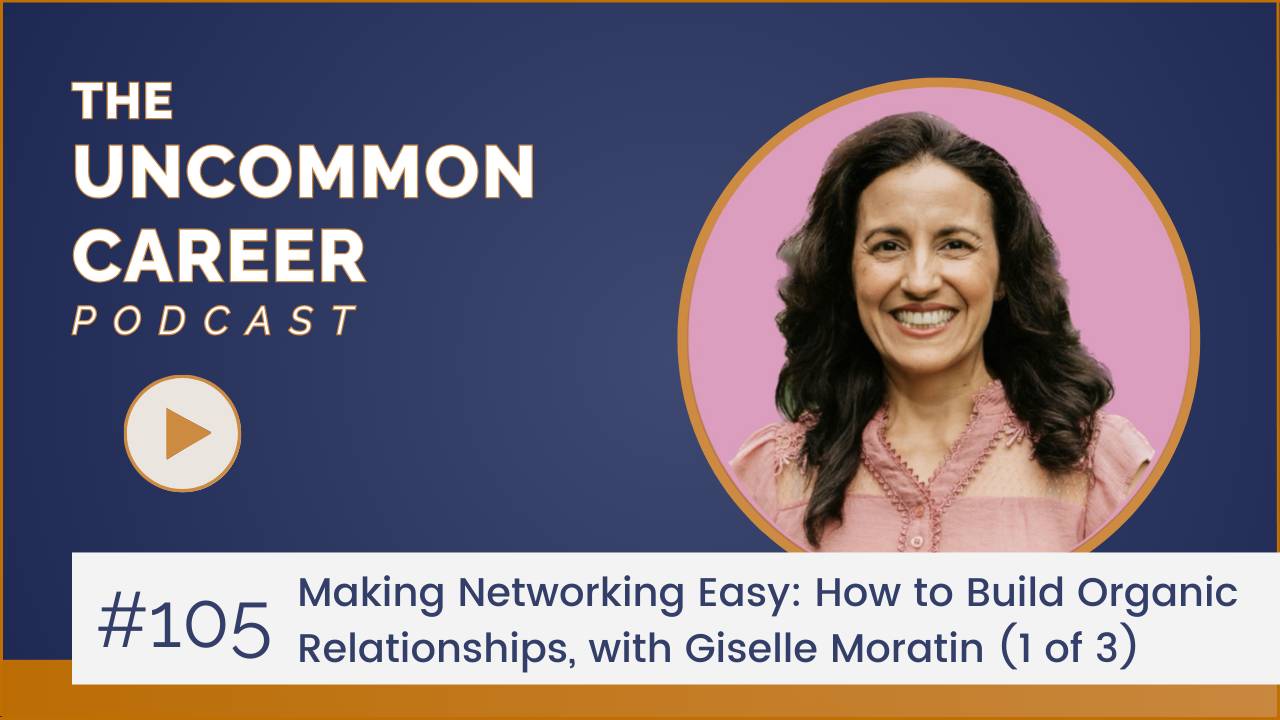106. The Confidence Killer: Why Smart People Freeze in Interviews
Apr 08, 2025
Interview Anxiety: How to Stay Confident and Clear When It Matters Most
You’re smart, experienced, and ready to shine. But the moment the interview begins, everything goes sideways. Nerves take over, thoughts race, and all that preparation seems to vanish. If this sounds familiar, you’re not alone—and more importantly, you’re not stuck.
Interview anxiety has a way of sneaking up, even on high performers. It shows up in blanking out on simple questions, second-guessing answers, or replaying mistakes long after the conversation ends.
The good news? There are ways to manage it—and turn anxiety into action.
|
Listen on your favorite podcast app: |
| |
That One Phrase That Triggers a Spiral
Two small words pack a powerful punch:
“What if?”
-
What if they ask about something unfamiliar?
-
What if there’s a riddle question?
-
What if the answer falls flat?
These questions might feel helpful in preparing for worst-case scenarios, but often, they do the opposite. They prime the brain to look for signs of failure—leading straight into the very outcome they were meant to avoid.
The key is shifting that focus. Redirect the attention from anxious guessing to calm, controlled action.
Anxiety Is Attention Turned Inward
Anxiety feeds on self-focus: how things might go wrong, how others might perceive the response, or how mistakes might be judged. Instead, that attention can be redirected:
-
From self → to the interviewer.
-
From doubt → to strategy.
-
From fear → to possibility.
Consider what's actually helpful to the person on the other side of the table.
What insights, accomplishments, or stories would genuinely add value to their team?
When the spotlight is moved from internal pressure to external impact, anxiety loses its grip.
Preparation Isn’t Just a To-Do List
Overthinking isn’t the same as preparing.
Real preparation means turning stories into muscle memory and confidence into clarity.
Ask:
-
What are the top three accomplishments that align with this role?
-
Can each be shared clearly, with outcomes and relevance?
-
Have they been practiced enough to come out naturally under pressure?
Preparation reduces decision fatigue.
When responses are second nature, energy is freed up to stay present and engaged.
Confidence Is Built Through Repetition
Confidence doesn’t come from hoping things go well—it comes from putting in the reps:
-
Practice aloud.
-
Talk through examples with trusted people.
-
Try out responses in low-stakes networking conversations.
By the time the interview arrives, those words and stories should feel familiar, not rehearsed.
Reframe the Interview Experience
The interview doesn’t need to feel like a high-stakes test.
Instead, think of it as a conversation—a chance to explore alignment and share solutions.
Rather than obsessing over performance, consider:
-
What are they hoping to solve with this hire?
-
What part of the role is most exciting?
-
Which part of the interview is an opportunity to experiment with new approaches or language?
Approach each interaction as a learning opportunity, not a pass/fail exam.
Perception Shapes Performance
Perception often creates the biggest confidence gaps.
It's easy to idealize the person on the other side of the table while minimizing personal strengths.
-
Avoid putting interviewers on a pedestal. They’re professionals—but also humans with challenges, distractions, and uncertainties.
-
Balance how strengths and weaknesses are viewed. Self-worth isn’t diminished just because someone else appears more polished.
Value isn’t less just because someone else’s feels louder.
The Four-Step Confidence Framework
True interview confidence starts long before the meeting begins. It’s built through this process:
-
Acknowledge the value.
-
Identify the moments that moved organizations forward.
-
Recognize the scope, metrics, and transformation brought to teams.
-
-
Articulate the value.
-
Translate experience into memorable, relevant language.
-
Frame stories in ways that hiring teams understand and remember.
-
-
Internalize the value.
-
Practice until it becomes natural to speak about accomplishments.
-
Share wins in real conversations—build fluency, not perfection.
-
-
Own the value.
-
Walk into the interview already believing in the ability to contribute.
-
Let that belief shape body language, voice, and presence.
-
Confidence is the result of alignment—between inner awareness and outward expression.
Quick Trick for Interview-Day Nerves
When nerves spike during the interview, use this grounding technique:
-
Place hands on the legs or seat of the chair.
-
Focus on the texture. Notice the temperature.
This simple action pulls the brain back into the present moment and away from anxious thoughts. It’s a subtle way to stay centered without losing momentum.
Take Control Today
Interview anxiety doesn’t mean unprepared.
It doesn’t mean unqualified.
It just means the spotlight needs to shift—from pressure to purpose, from fear to focus.
-
You bring something valuable to the table.
-
You’ve already come farther than most.
-
You have more control than it seems.
Every small step—every bit of clarity, every bit of practice, every shift in perspective—builds confidence.
Keep going.
The conversation that changes everything could be the very next one.












